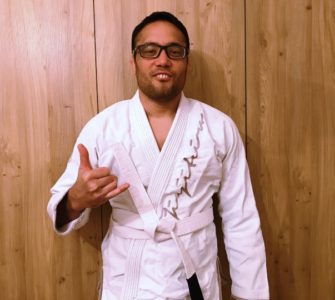Photo by Daria Kochetkova Photography. IG: Tebezvonu.
When talking jiu-jitsu with my training partners on the mats, it is difficult for me to exercise self-control in my speaking. Regardless of the specific subject, I have a hard time not blurting everything I know out all at once, quickly moving from thought to thought as I attempt to lay my thesis out before they lose interest and walk away. I don’t even fully understand why I do this. It could be a temptation as a senior rank to assert myself as a teacher to the lower ranks. It could be a base, and immature, urge to receive validation from my peers for what I do know about the subject. It could even be that I have a sincere desire to share my knowledge with them in the hopes that it will make them better (though I do question what a 20 minute spoken word essay will do for someone in terms of getting better at jiu-jitsu.)
Lately though, I’ve been making it a point to keep my mouth shut. I’ve been resisting the urge to offer unsolicited advice to every white belt I see. Resisting the urge to offer analysis into every technique someone attempts to do but fails. I’ve given myself a rule to not offer any information that was not specifically asked for. Because I’m talking less, I’m listening more.
“Most people do not listen to hear, they listen to reply.”
How has this changed my training? It may seem obvious, but because I’m listening more, I’m learning more. Regardless of the source, even a blue belt talking about what he saw on YouTube, I’m holding my tongue while they espouse to me the merits of the worm guard. Am I ever going to master the worm guard? Probably not, but that doesn’t mean there isn’t value in knowing more about it, and because I’m willing to let him talk without interrupting, I’m able to piggyback off the effort this blue belt has already put into learning about it. Is everything he’s going to say to me right? Probably not. Lots of people are ready to share their bad ideas with you, and listening doesn’t mean believing. However, if you don’t ever hear what people have to say, you have no way of knowing if they have anything worthwhile to share or not.
When you talk, you are only affirming to yourself what you already know. It is difficult to talk yourself into new knowledge. Though sometimes thinking out loud can lead to new revelations, I believe that thinking quietly to yourself before you speak will often provide the same benefit without forcing everyone else to listen to you blather. When you allow others to speak and really listen, not just wait for your turn to talk, you will be able to learn so much more. If you are not an academy owner or designated teacher, you have the luxury of waiting and listening, I suggest you take advantage of it.
Written by John Brashear.

















